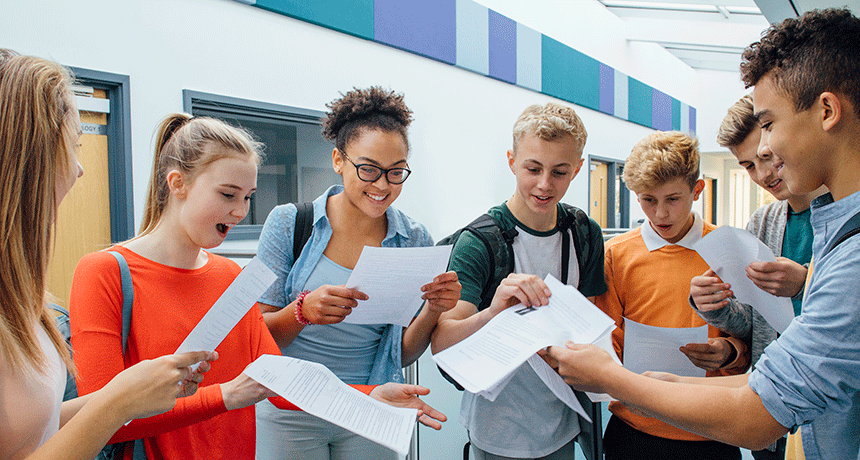Knowing what you don’t know can help your grades improve
A reduction in overconfidence nets students better test scores

Making sure students aren’t overconfident and that they know what they need to study could provide the key to test success.
DGLimages/iStockphoto
Confidence is a great thing, when you know what you’re doing. But if a student has no idea just how little they know, that undeserved confidence might be followed by a failing grade or two. The solution? Show students exactly what they don’t know, and how to tackle it, a new study says. Bursting that confidence bubble might be painful, but it improved students’ rock-bottom chemistry grades by 10 percent — turning a potentially failing grade into a passing one.
Charles Atwood was on a mission to bring up failing grades. He’s a chemist at the University of Utah in Salt Lake City. When he first arrived at the university, he says, the failure rate for the school’s introductory chemistry class was 37 percent! He immediately began looking for ways to help the students.
Knowledge alone isn’t what matters when it comes to passing a test. What students don’t know also matters. And when someone doesn’t know very much about a topic, they may not recognize just how little they know. As a result, they can end up overconfident. They might overestimate what they can do. The person might think they’ll get a C on the first exam, for instance, when they might not know enough to pass the test at all. This overconfidence has a name — the Dunning-Kruger effect.
Atwood’s graduate student, Brock Casselman, was looking for possible reasons why some of the chemistry students were failing and found out about this effect. He and Atwood realized that success for the students relied not just on what they knew but also on how much they didn’t know. If Atwood and Casselman wanted the students to improve, though, they would have to teach those students to recognize the gaps in their knowledge.
Just seeing a failing grade doesn’t help students figure out those gaps. “You’d think failing would boot them into gear [and get them to study what they don’t know], but it doesn’t,” says Casselman. For students with the worst grades, every time they faced a new quiz or exam, “they thought they would do better,” he says. “They’re highly resistant to being aware of how terrible they are.”
Thinking about thinking
Knowing just how bad they are in a subject may not help a student get better. Casselman and Atwood thought that promoting metacognition — or thinking about thinking — might help the students to identify where they needed help. Metacognition, says Atwood, is “basically assessing as you would your way through a problem.” In this case, it could help students analyze their own study skills. That could aid them in realizing just how much chemistry they didn’t know so they could study accordingly.
To see if metacognition could help their chemistry students in class, the scientists studied two introductory chemistry classes, each with 300 students. The classes were taught in the same way, with one key difference. Students in one class were asked before each exam or weekly quiz how they thought they would perform. After each test or quiz, they got their scores via a computer program. The computer also showed them if they had predicted they would perform better or worse than they actually did.
The computer program gave the students a list of potential study topics — topics that they’d been especially bad at on the last test. Then, the students were guided into making a study plan that would prepare them for the next exam.
At first, the students in the experimental class tended to fall victim to the Dunning-Kruger effect. They overestimated how well they would do on the tests by about 11 percent. But after a semester of guided study — and probably some blows to their pride — the students underestimated how well they would do on each test.
The class that got the guided study and the feedback on their quizzes also did better in the chemistry course. Overall, there was only about a 4 percent improvement in scores. But the poorest performing students — those who had been the most overconfident to begin with — showed the most improvement. Their grades improved by 11 percent. That’s enough to raise a D to a C. Casselman and Atwood published their findings October 20 in the Journal of Chemical Education.
“I think [the study is] thoughtful, it’s rigorous, it’s detail-oriented, and it was a pleasure to see it,” says David Dunning. Yes. That Dunning. The namesake of the Dunning-Kruger effect is a scientist who studies psychology at the University of Michigan in Ann Arbor. The best way to get rid of dangerous overconfidence is to learn more, he says. And the method proposed in this study is one way to get there. “It’s the combination of having people guess and [having them] come up with a plan,” he says. “That combination seems to be key.”
The training in metacognition was so successful, Atwood says, he’s put it to use in every class since. “I show them the data,” he explains. Then he asks the students if they want to learn using the old methods or the new methods that promote metacognition. The vote is no contest, he says. Students want to do better in the course, after all.
It’s no fun to poke a hole in a student’s confidence, but in the long run, the students are better for it. “Confidence does have its benefits,” Dunning notes. “But you want to be both confident and competent.”
Follow Eureka! Lab on Twitter







